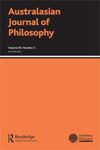Unconscious Pleasure as Dispositional Pleasure
IF 1
2区 哲学
0 PHILOSOPHY
引用次数: 0
Abstract
: A good deal of recent debate over the nature of pleasure and pain has surrounded the alleged phenomenon of unconscious sensory pleasure and pain, or pleasures and pains whose subjects are entirely unaware of them while experiencing them. According to Ben Bramble, these putative pleasures and pains present a problem for attitudinal theories of pleasure and pain, since these theories claim that what makes something a sensory pleasure or pain is that one has a special sort of pro-or con-attitude toward it at the time one experiences it. In this paper, I look at the two existing defenses of attitudinal theories against this worry and explain (following Bramble) that each is inadequate. I show that this inadequacy is in part a result of existing attitudinal theories failing to recognize an important distinction in pro-and con-attitudes, and I propose and defend an amended attitudinal view that does recognize this distinction. I then offer a more promising response to the objection from unconscious sensory pleasures and pains: that experiences of apparently unconscious pleasure or pain only seem pleasant or unpleasant because their subjects are disposed to experience pleasantness or unpleasantness. In this sense, unconscious pleasures and pains are not really pleasures or pains at all.无意识的快感即处置性快感
:最近关于快乐和痛苦的本质的大量争论都围绕着所谓的无意识感官快乐和痛苦现象,或者说主体在体验快乐和痛苦时完全没有意识到的快乐和痛苦。根据本-布兰布尔(Ben Bramble)的观点,这些假定的快乐和痛苦给快乐和痛苦的态度理论带来了问题,因为这些理论声称,使某种事物成为感官快乐或痛苦的原因是,人们在体验它时对它抱有一种特殊的赞成或反对态度。在本文中,我针对这种担忧审视了态度理论的两种现有辩护方式,并解释说(继布兰布尔之后)这两种辩护方式都有不足之处。我表明,这种不足的部分原因是现有的态度理论没有认识到赞成态度和反对态度之间的重要区别,我提出并捍卫了一种修正的态度观点,它确实认识到了这种区别。然后,我对来自无意识感官愉悦和痛苦的反对意见提出了一个更有希望的回应:显然无意识的愉悦或痛苦体验之所以看起来愉悦或不愉悦,只是因为其主体具有体验愉悦或不愉悦的倾向。从这个意义上说,无意识的快乐和痛苦根本不是真正的快乐或痛苦。
本文章由计算机程序翻译,如有差异,请以英文原文为准。
求助全文
约1分钟内获得全文
求助全文
来源期刊

AUSTRALASIAN JOURNAL OF PHILOSOPHY
PHILOSOPHY-
CiteScore
2.60
自引率
0.00%
发文量
51
期刊介绍:
The Australasian Journal of Philosophy (AJP) is one of the world''s leading philosophy journals. Founded in 1923, it has been continuously published ever since. It is recognized as one of the best in the analytic tradition, but is not narrow in what it regards as worthy of acceptance. Heavily cited in the general philosophical literature, it is covered by all the major abstracting and indexing services, including the Arts and Humanities Citation Index® which provides access to current and retrospective bibliographic information and cited references found in the world''s leading arts and humanities journals. In addition to Articles and Discussion Notes, the journal publishes Book Reviews and Book Notes as well as occasional commissioned Critical Notices. The journal is read world-wide and has recently published contributions from North and South American, European and Asian as well as Australasian authors.
 求助内容:
求助内容: 应助结果提醒方式:
应助结果提醒方式:


